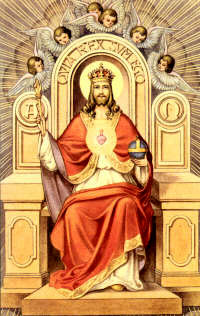My kingdom does not belong to this world.
(Jn 18:33b-37)

In a few weeks’ time we shall be celebrating Christmas. The prevailing mood of Christmas is one of joy. That is why Christmas carols are joyful. Is it any wonder that one Christmas carols goes this way? “Joy to the world. The Lord is come. Let earth receive her king.”
But we are so used to the joy of Christmas that we forget the possibility that the first Christmas was anything but joyful. Consider how desperate Joseph was looking for a place not for lodging but a place where Mary could give birth. In the end, Mary had to give birth in a place where no human ever gave birth—in a stable—because there was just no available space. A king born in a stable? Kings are born in palaces.
The King grew up in Nazareth, an insignificant place. “Can anything good come from Nazareth?” was not just the opinion of Nathanael. It was a commonly held opinion. But kings do not grow up in obscure places. Prince William and Prince Harry certainly were not bundled off to one of the far-off islands of the United Kingdom.
At 30 years of age, the King became an NPA. No permanent address because he became an itinerant preacher. To one who wanted to follow him, Jesus said: “Foxes have lairs, birds of the air have nests. But the Son of Man has nowhere to lay his head.” But kings are not homeless. They have palaces all over their kingdom. I heard one Filipino OFW who worked in Saudi Arabia. He was employed in the mainte-nance of the palaces of the Saudi King. He said that when the king was to stay in a particular palace, they had to go there a month ahead in order to prepare the palace for the king. Jesus had nowhere to lay his head.
At the age of 33, the King did not die peacefully in a royal bed. He did not die a glorious death while leading his army against the enemy. He died like hardened criminal—on the cross. When Pilate presented him as a king before the people, his crown was not of gold encrusted with precious jewels. It was a crown of thorns. His mantle was not made of ermine, trailing several feet long. It was the coarse mantle of a Roman soldier. His scepter was not made of gold either but was a reed with which the soldiers hit his head.
And when he died, he was buried in a tomb that was not his own. He was not born in his own home. He was not buried in his own grave.
If that was the end of the story, then the story of Jesus would have been a Greek tragedy. In a Greek tragedy the hero dies or is defeated at the end.
But the story of Jesus does not end with his death and burial. It continues with his resurrection and in fact, will go on until the end of time when Jesus returns as King of the Universe. The story of Jesus then is not a Greek tragedy, but a Greek comedy. In the Greek comedy, the hero is initially defeated but later recovers from his defeat to become victorious in the end. The ultimate victory of Jesus is what the Solemnity of Christ, the King, is all about.
But what does the victory of Jesus mean for us? The victory of Christ has some-thing in store for us for the future and for the present.
For the future. If we hold fast to Jesus, our story will also be a Greek comedy. No matter how bad, bleak or sad our past has been, no matter how terrible our pre-sent is, we know and sure what the future holds for us. We will rise to life and be with Jesus forever in heaven. And the ending of fairy tales will become a reality for us, “and they lived happily ever after.”
For the present. Because we are sure that in the end everything will turn out al-right, we are able face anything that life may throw at us. Consider this story. A man decided to bring his family to the countryside. He bought a farm which had been abandoned by its owner. The family was not thrilled by the change. One day they came to look at their future home. They entered the barn. There was fresh manure near the entrance. And they almost stepped on them. The reaction of everyone but the youngest was one of disgust. In contrast, the youngest got all excited and asked his dad, “Where’s the horse?”
Because we are sure that in the end everything will turn out alright, we are able to face anything that life may throw at us.


